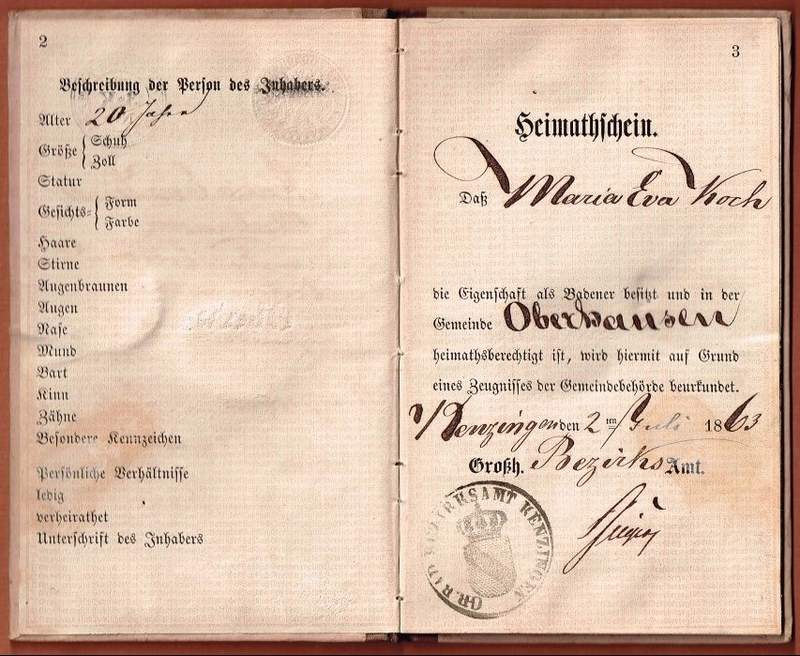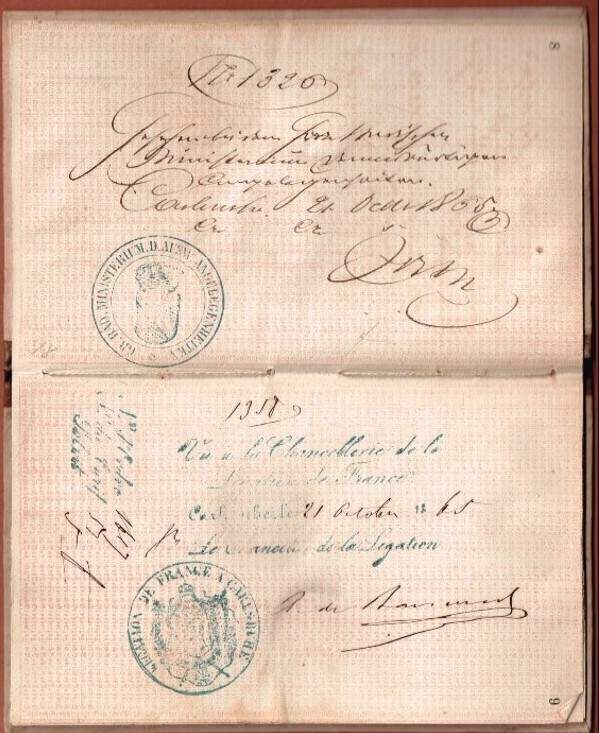Pass and Service book 1863 for a Maid
Pass Service book
When I first spotted the document, I thought it’s a Wander book, but actually, this one is a pass- and service book of a maid. But at the same time, it’s also a service book, passport, and a citizenship document. I have seen many such books but not in this combination. Wander books (journeyman books) were only issued in Germany, Austria, and Switzerland. Probably the same is valid for this Passbook. At least I never saw such ones from other countries. So this might be a “German” thing. Pass- and Service book.
The book was issued in 1863 to twenty years old Maria Eva Koch, which “…want to work in the city of Freiburg as a maid”. The book is valid for an indefinite time. On page one, you see three stamps—a Baden blind stamp, a tax stamp, and the local government office stamp. Page three confirms that Maria holds Baden citizenship, and pages 6-9 show employment places and the relevant local office stamps.




The Grand Duchy of Baden (Großherzogtum Baden) was a state in the southwest German Empire on the Rhine’s east bank. It existed between 1806 and 1918.
It came into existence in the 12th century as the Margraviate of Baden and subsequently split into different lines, unified in 1771. It then became the much-enlarged Grand Duchy of Baden through the Holy Roman Empire’s dissolution in 1803–1806. It was a sovereign country until it joined the German Empire in 1871, remaining a Grand Duchy until 1918 when it became part of the Weimar Republic as the Republic of Baden. Baden was bordered to the north by the Kingdom of Bavaria and the Grand Duchy of Hessen-Darmstadt; to the west, along most of its length, by the river Rhine, which separated Baden from the Bavarian Rhenish Palatinate and Alsace in modern France; to the south by Switzerland; and to the east by the Kingdom of Württemberg, the Principality of Hohenzollern-Sigmaringen and Bavaria.
After World War II, the French military government in 1945 created Baden’s state (originally known as “South Baden”) out of the southern half of the former Baden, with Freiburg as its capital. This portion of the former Baden was declared in its 1947 constitution to be the old Baden’s true successor. The northern half of the old Baden was combined with northern Württemberg, becoming part of the American military zone, and formed the state of Württemberg-Baden. Both Baden and Württemberg-Baden became states of West Germany upon its formation in 1949.
FAQ Passport History
Passport collection, passport renewal, old passports for sale, vintage passport, emergency passport renewal, same day passport, passport application, pasaporte passeport паспорт 护照 パスポート جواز سفر पासपोर्ट
1. What are the earliest known examples of passports, and how have they evolved?
The word "passport" came up only in the mid 15th Century. Before that, such documents were safe conducts, recommendations or protection letters. On a practical aspect, the earliest passport I have seen was from the mid 16th Century. Read more...
2. Are there any notable historical figures or personalities whose passports are highly sought after by collectors?
Every collector is doing well to define his collection focus, and yes, there are collectors looking for Celebrity passports and travel documents of historical figures like Winston Churchill, Brothers Grimm, Johann Wolfgang von Goethe. Read more...
3. How did passport designs and security features change throughout different periods in history, and what impact did these changes have on forgery prevention?
"Passports" before the 18th Century had a pure functional character. Security features were, in the best case, a watermark and a wax seal. Forgery, back then, was not an issue like it is nowadays. Only from the 1980s on, security features became a thing. A state-of-the-art passport nowadays has dozens of security features - visible and invisible. Some are known only by the security document printer itself. Read more...
4. What are some of the rarest and most valuable historical passports that have ever been sold or auctioned?
Lou Gehrig, Victor Tsoi, Marilyn Monroe, James Joyce, and Albert Einstein when it comes to the most expensive ones. Read more...
5. How do diplomatic passports differ from regular passports, and what makes them significant to collectors?
Such documents were often held by officials in high ranks, like ambassadors, consuls or special envoys. Furthermore, these travel documents are often frequently traveled. Hence, they hold a tapestry of stamps or visas. Partly from unusual places.
6. Can you provide insights into the stories behind specific historical passports that offer unique insights into past travel and migration trends?
A passport tells the story of its bearer and these stories can be everything - surprising, sad, vivid. Isabella Bird and her travels (1831-1904) or Mary Kingsley, a fearless Lady explorer.
7. What role did passports play during significant historical events, such as wartime travel restrictions or international treaties?
During war, a passport could have been a matter of life or death. Especially, when we are looking into WWII and the Holocaust. And yes, during that time, passports and similar documents were often forged to escape and save lives. Example...
8. How has the emergence of digital passports and biometric identification impacted the world of passport collecting?
Current modern passports having now often a sparkling, flashy design. This has mainly two reasons. 1. Improved security and 2. Displaying a countries' heritage, icons, and important figures or achievements. I can fully understand that those modern documents are wanted, especially by younger collectors.
9. Are there any specialized collections of passports, such as those from a specific country, era, or distinguished individuals?
Yes, the University of Western Sidney Library has e.g. a passport collection of the former prime minister Hon Edward Gough Whitlam and his wife Margaret. They are all diplomatic passports and I had the pleasure to apprise them. I hold e.g. a collection of almost all types of the German Empire passports (only 2 types are still missing). Also, my East German passport collection is quite extensive with pretty rare passport types.
10. Where can passport collectors find reliable resources and reputable sellers to expand their collection and learn more about passport history?
A good start is eBay, Delcampe, flea markets, garage or estate sales. The more significant travel documents you probably find at the classic auction houses. Sometimes I also offer documents from my archive/collection. See offers... As you are already here, you surely found a great source on the topic 😉
Other great sources are: Scottish Passports, The Nansen passport, The secret lives of diplomatic couriers
11. Is vintage passport collecting legal? What are the regulations and considerations collectors should know when acquiring historical passports?
First, it's important to stress that each country has its own laws when it comes to passports. Collecting old vintage passports for historical or educational reasons is safe and legal, or at least tolerated. More details on the legal aspects are here...
Does this article spark your curiosity about passport collecting and the history of passports? With this valuable information, you have a good basis to start your own passport collection.
Question? Contact me...

